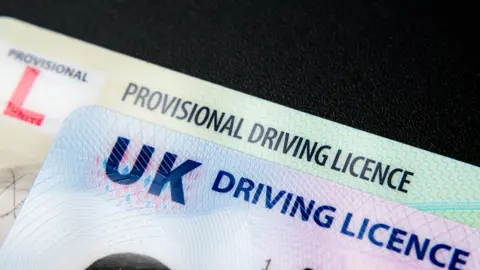
 Getty Images
Getty Images
Convicted benefits cheats who fail to pay back the taxpayer could be stripped of their driving licences, under government plans to crack down on fraud.
Those who repeatedly cheat the system and have debts of £1,000 or more could be punished with a driving ban of up to two years.
Work and Pensions Secretary Liz Kendall said the legislation would mean "greater consequences for fraudsters who cheat and evade the system".
The plans also include new powers to force banks to hand over account information about benefit claimants to help target investigations, echoing a scheme announced by the previous Conservative government.
But this is likely to face strong opposition from the banks and privacy campaigners.
The draft law would also give more powers to the Public Sector Fraud Authority, giving it more time to investigate complex cases of fraud that took place during the pandemic.
Current laws mean that repeat benefit cheats can already be imprisoned in the most serious cases.
Ministers have estimated greater access to banking data could save taxpayers £1.6bn over five years, by helping DWP investigators identify suspect claims more effectively.
But campaign groups have warned that it will invade claimants' right to financial privacy, and could lead to legitimate claimants being wrongly investigated.
In a letter to Kendall in September, the directors of Big Brother Watch and Age UK described the plans as "mass financial surveillance powers" which they said would "represent a severe and disproportionate intrusion into the nation's privacy".
Tory bill failed
Currently, the department can only request such financial information where it has reason to suspect fraud, and only in individual cases.
The previous government argued broader powers to obtain banking information in bulk would help investigators catch previously undiscovered fraud cases.
But a Tory bill to deliver the scheme failed to make it through Parliament before July's election.
Under that plan, financial institutions would have been required to send information to the DWP about bank accounts receiving benefit payments that indicated a "potential risk" of fraud or error, or face fines for not complying.
An official assessment of the law said the system would be "fully automated, running within existing banking systems" and be rolled out gradually from 2027.
At the time, Labour attacked the Tory legislation as "poorly delineated" – while Tory ministers argued wide-ranging powers were necessary to ensure they could apply to all types of future banks, including accounts with newer, online-only providers.
Conservative shadow work and pensions secretary Helen Whately said the government's bill was a "continuation" of work started by the previous government and Labour "must do more to tackle the spiralling welfare budget".
'Living abroad'
Since entering government, Labour has pledged that only "very limited information" will be shared with the department under its equivalent plan, but is yet to set out in detail how its system will work.
DWP minister Andrew Western confirmed last year this will include cases where claimants are "living abroad" without notifying the department, although a timeframe for this has yet to be specified.
Accounts could also be flagged if they are holding more than £16,000, the usual savings limit for being able to claim Universal Credit.
In a change from Tory plans, the government has said the new powers will not be used to target payments of the state pension.
Ministers have sought to reassure critics by emphasising that the DWP will not have powers to "access" bank accounts.
But campaigners have told the BBC they believe this is a "misdirection", as the measures would give DWP the power to instruct banks to access the information on its behalf.

 4 hours ago
2
4 hours ago
2









